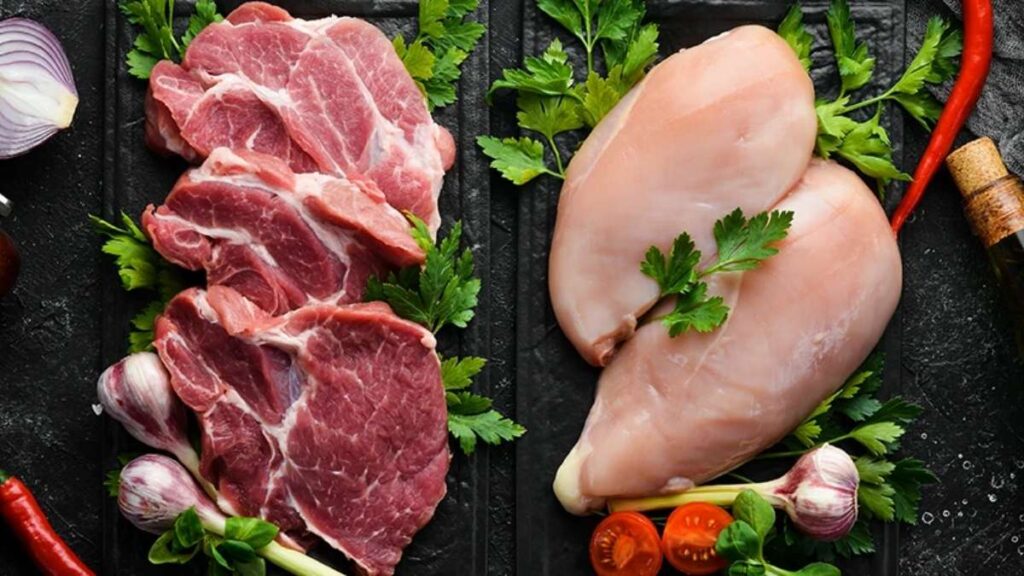Detailed Nutritional Information about Chicken (per 100 grams of cooked, skinless, boneless chicken breast):
- Calories: 165 kcal
- Protein: 31 grams
- Fat: 3.6 grams
- Saturated Fat: 1 gram
- Monounsaturated Fat: 1.2 grams
- Polyunsaturated Fat: 0.8 grams
- Cholesterol: 85 milligrams
- Sodium: 74 milligrams
- Potassium: 256 milligrams
- Carbohydrates: 0 grams
- Fiber: 0 grams
- Sugars: 0 grams
Vitamins and Minerals:
- Vitamin B6: 0.6 milligrams (30% of the Daily Value (DV))
- Niacin (Vitamin B3): 13.7 milligrams (69% of the DV)
- Phosphorus: 212 milligrams (21% of the DV)
- Magnesium: 29 milligrams (7% of the DV)
- Selenium: 26.6 micrograms (38% of the DV)
- Zinc: 1 milligram (7% of the DV)
- Riboflavin (Vitamin B2): 0.1 milligrams (7% of the DV)
- Thiamine (Vitamin B1): 0.07 milligrams (5% of the DV)
- Pantothenic Acid (Vitamin B5): 1 milligram (10% of the DV)
- Iron: 0.9 milligrams (5% of the DV)
Uses of Chicken:
- Protein Source: Chicken is an excellent source of high-quality protein, essential for muscle growth, repair, and overall body function.
- Weight Management: Due to its high protein content and relatively low calorie and fat content, chicken is often included in diets aimed at weight loss or maintenance.
- Versatility in Cooking: Chicken can be cooked in various ways, such as grilling, baking, roasting, boiling, or stir-frying, making it suitable for a wide range of dishes and cuisines.
- Nutrient-Rich: Chicken provides several essential vitamins and minerals that contribute to overall health, including B vitamins (important for energy metabolism), phosphorus (for bone health), and selenium (an antioxidant).
- Heart Health: When prepared without added unhealthy fats and in moderation, lean cuts of chicken can be part of a heart-healthy diet.
- Dietary Restrictions and Preferences: Chicken is a staple in many diets, including those that are low-carb, ketogenic, paleo, and high-protein.
- Building Immunity: The vitamins and minerals in chicken, particularly B vitamins and selenium, support immune function.
Detailed Nutrient Functions:
- Protein: Essential for the repair and growth of tissues, enzymes, and hormones. Helps maintain muscle mass and supports metabolic functions.
- Vitamin B6: Important for brain development and function, and helps the body convert food into energy.
- Niacin (Vitamin B3): Supports the digestive system, skin health, and nerve function. It also helps convert food into energy.
- Phosphorus: Vital for the formation of bones and teeth. It also plays a role in how the body uses carbohydrates and fats.
- Magnesium: Involved in over 300 biochemical reactions in the body, including muscle and nerve function, blood glucose control, and bone health.
- Selenium: Acts as an antioxidant, helping to protect cells from damage. It also plays a role in thyroid health.
- Zinc: Supports immune function, protein synthesis, wound healing, DNA synthesis, and cell division.
- Riboflavin (Vitamin B2): Helps convert food into energy and supports cellular function, growth, and development.
- Thiamine (Vitamin B1): Plays a crucial role in energy metabolism and the growth, development, and function of cells.
- Pantothenic Acid (Vitamin B5): Essential for the synthesis and metabolism of proteins, carbohydrates, and fats.
- Iron: Crucial for the production of hemoglobin, which carries oxygen in the blood.
Pros and Cons :
Pros:
- High in protein
- Low in fat (particularly in skinless, boneless cuts)
- Rich in essential vitamins and minerals
- Versatile in cooking
- Can be part of a heart-healthy diet
- Supports weight management
Cons:
- High in cholesterol (especially in dark meat and skin)
- Potential for antibiotic and hormone residues in commercially raised chickens
- Risk of foodborne illness if not handled and cooked properly
- Environmental impact of poultry farming
- Contains saturated fat in certain cuts
- Possible allergies in some individuals





